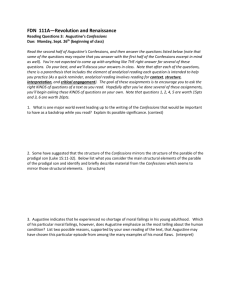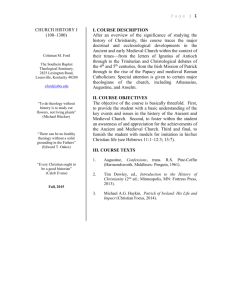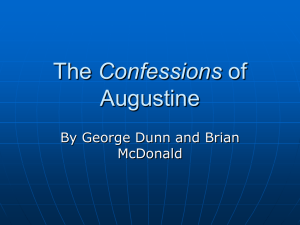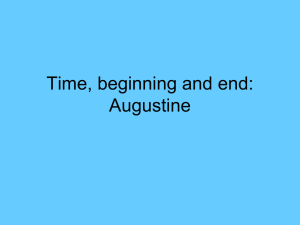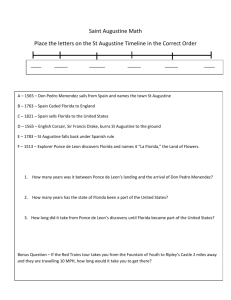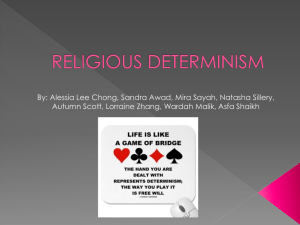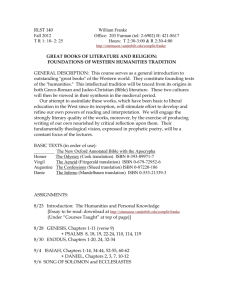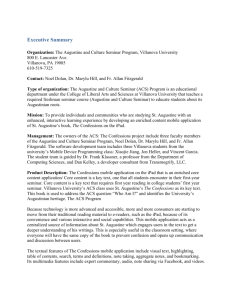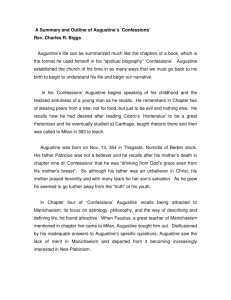A sermon preached by the Rev`d Canon Dr
advertisement
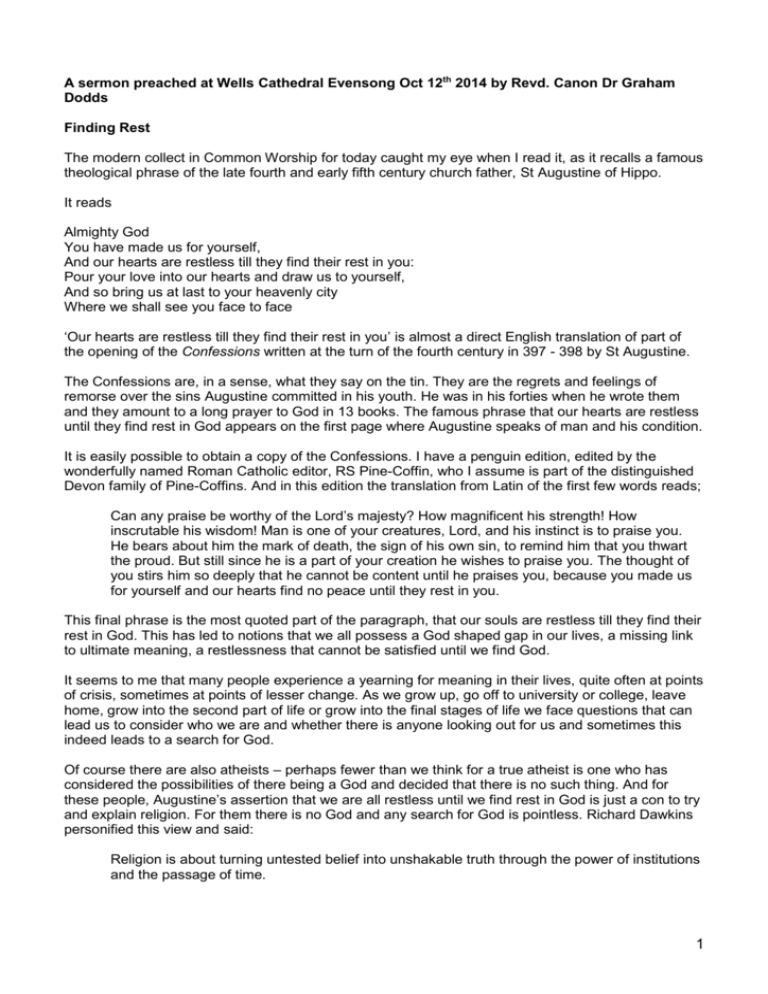
A sermon preached at Wells Cathedral Evensong Oct 12th 2014 by Revd. Canon Dr Graham Dodds Finding Rest The modern collect in Common Worship for today caught my eye when I read it, as it recalls a famous theological phrase of the late fourth and early fifth century church father, St Augustine of Hippo. It reads Almighty God You have made us for yourself, And our hearts are restless till they find their rest in you: Pour your love into our hearts and draw us to yourself, And so bring us at last to your heavenly city Where we shall see you face to face ‘Our hearts are restless till they find their rest in you’ is almost a direct English translation of part of the opening of the Confessions written at the turn of the fourth century in 397 - 398 by St Augustine. The Confessions are, in a sense, what they say on the tin. They are the regrets and feelings of remorse over the sins Augustine committed in his youth. He was in his forties when he wrote them and they amount to a long prayer to God in 13 books. The famous phrase that our hearts are restless until they find rest in God appears on the first page where Augustine speaks of man and his condition. It is easily possible to obtain a copy of the Confessions. I have a penguin edition, edited by the wonderfully named Roman Catholic editor, RS Pine-Coffin, who I assume is part of the distinguished Devon family of Pine-Coffins. And in this edition the translation from Latin of the first few words reads; Can any praise be worthy of the Lord’s majesty? How magnificent his strength! How inscrutable his wisdom! Man is one of your creatures, Lord, and his instinct is to praise you. He bears about him the mark of death, the sign of his own sin, to remind him that you thwart the proud. But still since he is a part of your creation he wishes to praise you. The thought of you stirs him so deeply that he cannot be content until he praises you, because you made us for yourself and our hearts find no peace until they rest in you. This final phrase is the most quoted part of the paragraph, that our souls are restless till they find their rest in God. This has led to notions that we all possess a God shaped gap in our lives, a missing link to ultimate meaning, a restlessness that cannot be satisfied until we find God. It seems to me that many people experience a yearning for meaning in their lives, quite often at points of crisis, sometimes at points of lesser change. As we grow up, go off to university or college, leave home, grow into the second part of life or grow into the final stages of life we face questions that can lead us to consider who we are and whether there is anyone looking out for us and sometimes this indeed leads to a search for God. Of course there are also atheists – perhaps fewer than we think for a true atheist is one who has considered the possibilities of there being a God and decided that there is no such thing. And for these people, Augustine’s assertion that we are all restless until we find rest in God is just a con to try and explain religion. For them there is no God and any search for God is pointless. Richard Dawkins personified this view and said: Religion is about turning untested belief into unshakable truth through the power of institutions and the passage of time. 1 His understanding is quite clear. Religion and particularly institutionalised religion, by which we might surmise he means the church in Christian terms, becomes the excuse to believe in something, even if there is little evidence for it. Yet it is interesting that Dawkins hasn’t lost his sense of searching. He says: My eyes are constantly wide open to the extraordinary fact of existence. Not just human existence, but the existence of life and how this breathtakingly powerful process, which is natural selection, has managed to take the very simple facts of physics and chemistry and build them up to redwood trees and humans. Just because he is an atheist doesn’t debar him from agreeing at least to some extent with Augustine. He experiences the ‘restlessness’ of exploration that many explorers demonstrate, and he gasps, rather like Augustine gasps at God, at the ‘breathtakingly powerful process’ that produces redwoods and human beings. Augustine says in the opening passage in his Confessions that man’s instinct is to praise God. He says, ‘Man is one of your creatures Lord, and his instinct is to praise you.’ But to get to that position sometimes involves stepping stones along the way. We tend to hear of the dramatic conversion stories, for they make news, Paul Constantine, Augustine, Luther, John Newton, John Wesley and many others throughout the ages. Yet for most people, there are many stages of coming to trust God, in coming into faith. And for all of us ‘finding our rest in God’ is a lifetime’s task, which will not be completed until, as the collect suggests, we are brought to the heavenly city where we shall see God face to face, and perhaps the writer of the collect is alluding to another of Augustine’s great books, City of God. So the collect encourages us to find our rest in God. And yet I want to suggest that there is a paradox here. I remember a particular Sunday some 25 years ago when I was leading a communion service in a church in Reigate, Surrey, where I served my title. We came to the peace and I invited the people to share a sign of peace by saying the famous words, ‘The peace of the Lord be with you’. And they replied, ‘And also with you’. And at that split second I realised that the person who needed God’s peace the most was me. Not because I had done something wrong or was stressed out, but because, as I realised later, I had divine discontent. The phrase divine discontent comes from a vocations handbook and is used when God is stirring someone up, making them a bit uncomfortable to teach them something, interrupting their everyday life with a new direction or way of thinking. My divine discontent made me start the journey of applying for a new post and moved me to Bath as an incumbent. And since then, from time to time, not always connected with a physical move, God has stirred me up by making me restless. So although Augustine’s ambition is to find rest, we may find that God not only eventually gives us rest, but he may also be making us restless. Perhaps the most famous use of the word ‘rest’ is in the euphemism Rest in Peace. I was at a memorial service yesterday in Clifton Cathedral for a good friend and work colleague, Mervyn Davies, who was a Roman Catholic. He was also at one point Director of Studies at the Methodist Wesley College in Bristol. Mervyn was my doctoral supervisor and it is to him that I owe my deep love of the 19th century theologian, John Henry Newman. Towards the end of the service, which was led by one time Principal of the college, Jonathan Pye, two prayers were used side by side. I knew both prayers very well, one by Newman, the founder of the Oxford Movement and the other by John Wesley, the founder of the Methodist movement. I had never put them together, but when Jonathan did, they illustrated for me what finding God’s rest is about. And so I want to end today with these two prayers, which speak for themselves, from both Newman and Wesley, who were in some ways at opposite ends of the church. Yet they both found this sense 2 of resting in God, which by no means meant inactivity, rather, it gave them a profound sense of purpose for their work and a deepening relationship with God. The first is a meditation by Newman (slightly abridged): God has created me to do Him some definite service. He has committed some work to me which He has not committed to another. I have my mission. I may never know it in this life, but I shall be told it in the next. I am a link in a chain, a bond of connection between persons. He has not created me for naught. I shall do good; I shall do His work. Therefore, I will trust Him, whatever I am, I can never be thrown away. If I am in sickness, my sickness may serve Him, in perplexity, my perplexity may serve Him. If I am in sorrow, my sorrow may serve Him. He does nothing in vain. He knows what He is about. He may take away my friends. He may throw me among strangers. He may make me feel desolate, make my spirits sink, hide my future from me. Still, He knows what He is about. The second is the Methodist Covenant Prayer by John Wesley: I am no longer my own but yours. Put me to what you will, rank me with whom you will; put me to doing, put me to suffering; let me be employed for you or laid aside for you, exalted for you or brought low for you. Let me be full, let me be empty, let me have all things, let me have nothing. I freely and wholeheartedly yield all things to your pleasure and disposal. And now, glorious and blessed God, Father, Son and Holy Spirit, you are mine and I am yours. So be it. And the covenant made on earth, let it be ratified in heaven. Amen. 3

